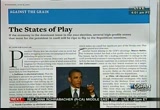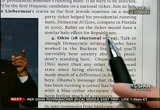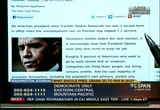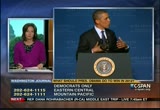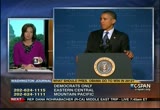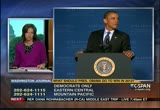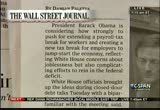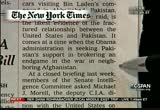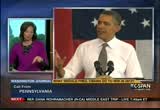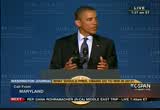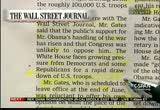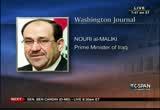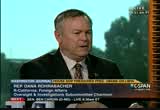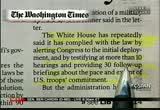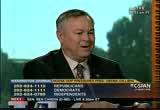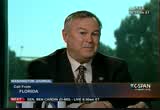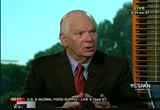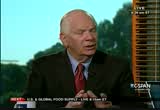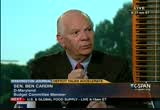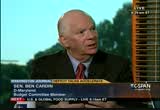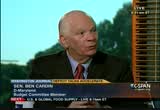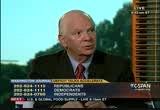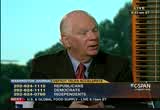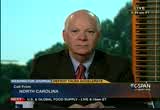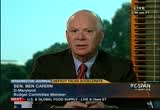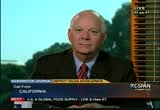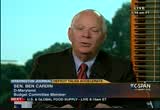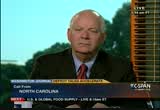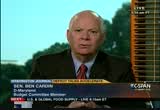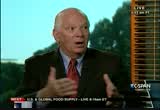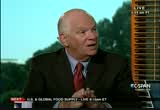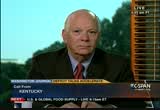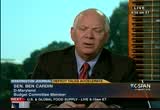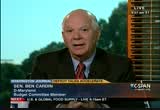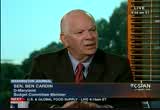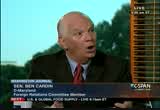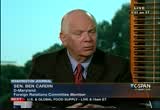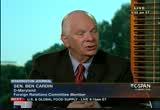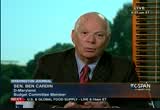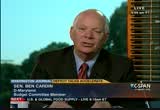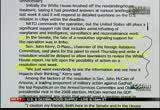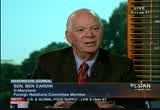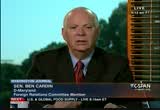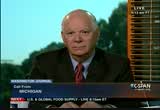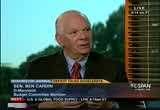tv Washington Journal CSPAN June 15, 2011 7:00am-10:00am EDT
7:00 am
maryland senator ben cardin will discuss federal spending and the medicare program. the g-20 agriculture ministers will meet in paris next week. later in the program, the npr economics correspondent will give a preview of the meetings and talk about the global food supply. ♪ host: confirming done nomination of leon panetta to be the next defense secretary. he is not expected to face significant opposition on the floor. also, defense officials testifying before a subcommittee about the military spending priorities for the next year. live coverage at 11:00 a.m. on c-span.org.
7:01 am
president obama hosting a congressional picnic at the white house. good morning on this wednesday morning, june 15, 2011. we will begin with democrats only to see what president obama needs to do to win reelection. yesterday we talked to republicans only about their debate. the telephone numbers are on the screen. let's begin with the latest daily gallup poll showing president obama's approval rating. 47% of prove right now, 46% disapprove. those are the latest numbers. what do you think president obama needs to do to win in 2012? "national journal" has this piece in their publication. the economy is the dominant issue. several states could flip to the
7:02 am
republican nominee. this reporter interviewed 10th veteran democratic and republican strategist to get their sense of which states would be toughest for obama to hold onto. here is the list of five states that are likely to vote republican. indiana, north carolina, florida and, with 29 electoral votes. another factor playing into the gop advantage is marco rubio. he has kept a low profile since being elected to the senate. he looks like a leading contender to emerge as the presidential nominee's running mate. if he would be selected, you'd be the first hispanic candidate on a national ticket.
7:03 am
the other two states, ohio and nevada. we're talking with democrats only this morning. what does president obama need to do to win in 2012? here are some comments about his trip to pr. while they cannot vote for the president, those who live on the mainland can. they applaud president obama for visiting their homeland. that is the "new york daily news." also, the "baltimore sun." orlando florida has the most, followed by philadelphia,
7:04 am
chicago, tampa, austin, miami, fort lauderdale, washington, d.c., and then los angeles. orlando topping this with the most porter ricans in that area. we will go to pennsylvania. what do you think? caller: president obama needs to focus on new technology, it using high-tech robotics and manufacturing, and a new energy policy that will make america more fiscally responsible. host: it is the economy. caller: it is the economy that matters. focusing on supercomputing and job creation. host: here is the "new york times." it was written by benjamin applebaum. no democratic president since franklin delano roosevelt --
7:05 am
let's go to tampa, florida. alex, what do you think? caller: the economy is the first priority for everyone right now. not only here in the u.s., but around the world. president obama will have a huge problem next year with a latino vote because he only got one reform, dealing with immigration. i did -- i do not know how he is
7:06 am
going to deal with that next year. you already have 12 states that want to do their own immigration laws. from my point of view, it will be a powerful issue for both parties. host: are you going to stay home? caller: i am disappointed. they are taking advantage of the minorities that cannot defend themselves. instead of fixing the problem, they are making it worse every single month. host: might from wisconsin. caller: we need to put tariffs back in place to create fair trade. then we need to go back to pre- reagan tax rates. then you have to eliminate corporate tax altogether, since 67% of corporations do not pay taxes right now.
7:07 am
and then reduce the defense budget by 50% over three years. if he makes that is platform, he will put people back to work, balance the budget, and the economy will come back. host: why the defense budget for 50%? caller: right now we spend almost 50% of the entire world's budget on arms and military. it seems to me that that is completely disproportionate, when russia only spends 3.4% of the world's entire spending on defense. it is outrageous. the other thing we have to do is eliminate the five wars, going on six, that we are participating in right now. absolutely no strategy, not approved, congress has not approved these wars, and it goes on. it has to end. we can no longer afford to be
7:08 am
doing this adventurism all over the world. host: president obama and the democrats are setting a $60 million fund raiser gold for june. this is for the president's reelection campaign and the dnc. two people familiar with the goals that it was part of your presentation in chicago to top democratic fund-raisers. a bomb or raise $750 million in 2008 and his advisers have privately told donors that they hope to match the amount or exceeded. the 2012 reelection campaign could pull in $1 billion. michelle obama is doing fundraisers as well. mississippi, go ahead. caller: he is doing real good right now. i think he needs to keep a steady course.
7:09 am
he has a good mind, and he is trying to do the best that he can. what he needs his help from the republicans. host: you sound like you are a strong supporter of the president. should he compromise at all with republicans? caller: he has compromised enough. it is on their hand. he cannot correct the mess that they made all by himself. they need to try and make this country a better country instead of trying to make it of republican nation. host: we heard from alex from four of -- florida earlier. here is the headline, "slugger reach out to hispanic voters." and this morning, the "baltimore sun", barack obama says that it
7:10 am
is the last time that voters will see his name on the ballot. corpus christi, texas, guthrie. caller: obama has done a good job. he is dealing with what he has to deal with, and he should keep on doing what he is doing. i am for him 100%, and the hispanic collar that just called a while ago, the republicans will use them like they normally do to get their votes. they do not care anything about the issues. they are the ones that are doing the immigration reform, and texas is getting ready, and rick
7:11 am
perry will be behind it. i did not support rick perry and texas politics and definitely if they get him to run on the national scene as president. host: t you think that he is going to run? caller: yes, he definitely is. i will not vote for an. host: mary in kentucky. caller: president obama should do just what he is doing. he is in a bad situation right now. we must all recognize that. i am unemployed right now, but i have worked all of my life. there are some narrow minded people [unintelligible] if he stays kcalms, heaps
7:12 am
walked into that situation and turned around. i will continue to vote for him. host: will you campaign for him? caller: yes, i will. host: did you donate money last nintime? caller: yes, i will. and i will donate again because he is the one that should be there in 2012. he is saying calm individual. host: there is the "financial times" with some economic news. we covered this event with the federal reserve chairman made those remarks. if you want to watch it, go to our website, c-span.org, and in the upper right-hand corner, you will find the video library. punch in ben bernanke's name and
7:13 am
you can watch that. paul ryan also spoke at that event. you can watch that as well. as good a tucson, arizona. robert, what should president obama due to win in 2012? caller: he will set up the tone and the rhetoric to have people understand the situation. it deals with the economic dna, let's say, from this round in 1981, when mr. reagan set up a deal for the world while the entire thing, and he needs to use the term -- is a, i am an economic and genius, and i made political activists and a political genius. and i follow this year. my dad told me when i was a little kid what caused the great depression. it was the same thing.
7:14 am
you look at the dna and is all over the place. you also look at a model, ok? if you look at the model, it was the same thing as what caused the great depression. and i would not call this year of recession. i would call it a depression, ok? so that these people that bad mouthed mr. obama, they are terrible. host: here is a tweet. a listener in virginia. caller: president obama has already done a good job. he helped the economy which was all screwed up when he came in. he also caught bin laden. this man is great for this country. people should be satisfied of the job that he is doing. caller: we will go to florida, a shot.
7:15 am
-- chuck. caller: i think president obama is doing great. he should challenge the house more. they could raise all of this stuff that no one is going to take seriously. but being from florida, miami, that was to get the miami vote. they want those two extra seats from florida. the president should just hang in there. host: on the debt talks that we talked about yesterday, the bipartisan group led by joe biden met yesterday and they are meeting on thursday. here is the "wall street journal." president obama is considering how hard to push for a new tax -- -- payroll tax cut.
7:16 am
7:17 am
the front page of the of the " washington times" on the situation in libya. john boehner sent a letter to president obama on the simmering constitutional conflict. unless he gets authorization from congress, he will be in violation of the war powers resolution. it says that mr. obama must provide a sense of justification by friday for committing troops to libya. bryan, ohio, dolores joins us.
7:18 am
what does president obama need to do to win in 2012? caller: i am very pleased to be able to talk to you. i have listened for over 30 years. i am a 69-year-old democrat who was campaigning for president obama. i was so joyous when he became president. i am losing faith, however, in our system. i believe we no longer have a democracy of the people. the people no longer have a voice in electing our president. right now money elect our presidents. i was chagrined, not the strong this word, when i saw our present standing the side wall street executives appealing to them for their support.
7:19 am
right now in congress, there is legislation pending called barry elections now. -- fair elections now. if we the people do not demand that our representatives passed legislation to make elections again by the people of this country, then i fear greatly for our future. caller: karen in illinois. host: i suggest they in the tax breaks for businesses that move jobs overseas, give them to businesses that stay in the u.s., in the lopsided export/import tax. when we try to send products to china, the charges 25%. host: windy -- wendy in new
7:20 am
hampshire. caller: obama needs to make sure that every decisions he makes and every vote he cast is in accordance with the sermon on the mount, the beatitudes. i think that every senator and representative needs to do the same thing. he needs to make sure to stop compromising with republicans over such thing as medicare, medicaid, social security, the epa, -- i do not know what the agency is called that is overseas, the banking regulations -- and that he should call people on the hypocrisy of those who proclaim that they are devoutly religious and confront them with the fact that the votes that they are casting in the decisions they are making are in complete contradiction to the sermon on the mount, the
7:21 am
beatitude. the need to cut out the gross waste, fraud, and abuse for the full oil and gas subsidies, but far and subsidies, -- foreign subsidies, paying farmers to not grow food, i think that he should cut out -- indicted osama bin laden for crimes against humanity instead of going to war. we need to help the people of libya. but not fight their because we cannot avoid it. call the republicans on their hypocrisy. host: that is a long list. if the president cannot accomplish all of those things,
7:22 am
will you vote for him? caller: i would never vote for the republicans. i have to cancel out of both people who would take assistance away from the most needy. i will not help them and putting people who are disabled, elderly, poor, children out on the street. host: will you campaign for him in done in money? caller: i would donate money only to those democrats who have not turned against anthony weiner. i'm a great supporter of him. i am ashamed of my own party for dumping on him. i am very proud of chuck schumer and kirsten gillibrand. i live in nova scotia for five months out of the year. host: we will leave it for their. more democrats have come out calling for anthony weiner to
7:23 am
resign. we will talk with members of congress, beginning with dana rohrabacher this is on the foreign affairs committee. and then senator ben cardin of maryland. he is a budget committee member as well. we will pull off talking about deficit talk and foreign affairs with both of them. caller: i think he should bring back the majority of soldiers in afghanistan, and for the ones that stay there, we should have a war tax. he should let the taxes go back to where clinton -- when clinton was president. he should get jobs by working on infrastructure. i think that anyone who would vote for republicans who would
7:24 am
cut food four little babies should never be elected. the republicans are cutting so many things that help poor people, and anyone who is poor or anyone that would vote for a republican now is crazy. host: jack in philadelphia, what does president obama need to do to win in 2012? caller: he has done a reasonably good job. he did not create the financial distress that we are under right now. host: he did not create it to you -- has he done enough to turn it around? caller: he has done as much as he can. it is a difficult is -- situation. look at who is responsible for it, republicans and this business -- big businesses sending the jobs over the seas.
7:25 am
people who voted for the republicans would be committing suicide. host: let's stay with the president. what are your priorities for the economy and has he met those? caller: i like to see him get out of the war is that he are in. we should get the rich jews to pay for the wars, they are the ones that got us into them. host: we're following mitt romney, one of the republican contenders for the gop nomination. social offered this is not keeping mitt romney down. romney is confident and competent.
7:26 am
dana milbank this morning. many have pieces on michele bachmann and her performance at the gop debate. another story about michele bachmann in the "usa today," already emerging as one of the congress most prolific of fund- raising share is $13.5 million for election, more than any other house incumbent.
7:27 am
the trend has continued this year. she collected more than 1.7 million during the first three months of this year. frederick, md., we're talking about president obama winning reelection. caller: first of all, thank you for taking my call. i believe that president obama is doing a wonderful job. the policies that he and his fellow democrats are trying to push through the house and the senate to get this economy back on its feet are getting blocked by republicans. everything that they try to do to help this economy recover, they are blocking. what i do not understand is why the media is not exposing these crooks for what they are doing.
7:28 am
what he really needs is and these two wars. he needs to do that, -- end these two wars. by the republicans and let us know what they're doing. they are going to destroy this world if we allow allow them to get into control. obama has done everything that he can to at this point in his election, in his term. he has done everything humanly possible. i do not understand what else he could possibly do. host: we will go to robert in virginia beach. caller: i do plan to vote for obama in 2012. i was unsure because of how he has been treating people in the middle class, the progressive base, young people and students, but after watching the republican debate on monday, it was just scary.
7:29 am
i'll vote straight democrat this year and next year. but i think that obama could benefit ending the wars and pushing more progressive things. it is good to see that all of the -- most of the blue dogs were sent out. he needs to do more to energize the left wing of the democratic party, to help him win reelection next year. host: the senate sparred over the ethanol tax credit. they appeared to break with gop orthodoxy against higher taxes to cancel billions of dollars in ethanol tax credits.
7:30 am
cover and demanded the west -- coburn possible amendment would have been didn't $6 billion in ethanol credits. caller: i agree completely with the woman before this last man. if people would watch the senate and house like i have, i am 67 years old, and i am thankful for your program, but it they would just watch. the republicans in the house
7:31 am
have given and both to one man. they are not listening to it -- an oath to one man very they are not listening to their constituents. host: let's focus on president obama. caller: he is doing very good. if people would just watch. if republicans would just listen to 80% of their own constituents, get rid of the well subsidies, then it would be good. host: you have made your point and we're moving on. the land in tennessee -- glenn in tennessee. caller: barack obama should focus on one project. spend this money that he still has available, go spend the money with the full force of the federal government in rebuilding
7:32 am
detroit and show the rest of the nation how we should be moving into the 21st century. that is my comment. host: the "new york times" reports on the up hope bridging upholding the ruling on gay marriage. then also from the "new york times," u.s. history still troublesome for u.s. students, tests show. and though wall street journal shows in an interview with defense secretary gates, who will be of testifying before the subcommittee, live coverage on c-span.org, pc support for the war exit plan. the public support for mr. obama is handling of the war has risen and that congress was unlikely to oppose him.
7:33 am
there is growing pressure for rapid drawdown of u.s. troops. a slow withdrawal to consolidate battlefield gains. he is being pressed to be withdrawn quickly, who worry that unease over the war could hurt democrats at the polls next year. allentown, pa., talking about president obama in 2012. caller: it is nice to talk with you this morning. i have five or six points i like to make. barack obama should publicly reconcile what reverend jeremiah right. number two, a lot like obama to demand that lobbyists for israel
7:34 am
7:35 am
what they republican powerful people are trying to do to the country. they do not understand it. any time you get the american -- i mean, the supreme court justices to spend the weekends with his alter conservative groups, and then pass all law that corporations are individuals and can donate all the money they want to, they do not see this -- in the next 10 or 20 years, we will not have a country. you can vote or nothing. if you do not have money, you will not be able to live. you might need to pack up and go down to mexico. maybe we could start over there. host: we told you earlier about speculation that marco rubio could be someone's running mate in 2012. yesterday he gave his maiden speech, the last freshman
7:36 am
senator to do so. >> we find ourselves in a new century. there is a growing sense that for america, things will never be the same. maybe this century will belong to someone else. indeed we stand at a turning point in our history. one where there are only two ways forward for us. we will either bring on another american century or we are doomed to which in -- witness america's decline. another american century is fully within our reach because there is nothing wrong with our people. the american people have not forgotten how to start a business. the american people have not run out of good ideas. we americans are as great as we have ever been. but our government is broken. it is keeping us from doing what we have done better than any people in the history of the world, create jobs and prosperity. if we here in washington could find agreement on a plan to get control of our debt, if we could
7:37 am
just make our tax code simpler and more predictable, if we get the government to ease up on onerous regulations, the american people will take care of the rest. host: we're talking with democrats only this morning -- what should president obama and do to win reelection in 2012? yesterday we talked with republicans only after the gop debate. caller: i think the way that the president and differentiate himself is to simply point out the difference between growth for many or greed for a few. others have decided that they will hold out on allowing the united states to grow in anyway, as opposed to holding on and
7:38 am
7:39 am
caller: good morning. i think what the president should do, number one, is cut congress's salaries by 75%, save money. sending so much foreign aid to countries, increase social security as the economy increases, everything has doubled in the last two years. i like to challenge the congress to live on what i get, $863 a month on social security, and pay bills and survive. i think mr. obama should also go back to the constitution the way that it is written. host: did you vote for him in 2008? caller: yes, i did. host: would you change for him which will you vote for him in
7:40 am
2012? caller: unless he changes, no. host: what do your friends say about social security? and whether they will vote for him over that issue? caller: no, because of the freeze? social security, i get medicaid, i get 80% and i have to pay 20% out of my pocket, $115. take that from my social security, that is your vehicle to your doctor, my doctors one under 75 miles away. i'm on the verge of bankruptcy. host: jackie in milwaukee. are you with us? you are on the air. caller: thank you. i support president obama and i am quite disturbed about those
7:41 am
wanting to take our country back. i am not sure exactly what is going on. if congress will come together with the president and worked for the people, what else can he do? he has limited powers. it seems like we have gone crazy since he has been elected. congress has to work together, they work for us. i don't feel that they supported the president since the very beginning, since he has been elected. i am concerned about education. i look at all the cuts in wisconsin where gov. scott walker is. he has done everything he can do to not create jobs, not let people work, and not let people have their rights that they have been given. i think president obama should come out and just be frank with the people. say, this is where we are, we
7:42 am
are in a recession. and we have to come together as a country. i think the whole republican agenda has just been negative, and that is not how we are as americans. host: two financial stories for you. this is the "washington post." consumer panel in jeopardy. just before the launch of the consumer federal -- financial protection bureau, its future is in danger after a standoff. of an old wall street journal," front page story, u.s. regulators behind schedule in implementing rules for the financial overhaul. they have agreed to delay a
7:43 am
whole host of new requirements scheduled to hit the 600 trillion dollar derivatives market next month. daytona beach, sam. a couple of more phone calls about what president obama should do to win 2012. caller: in florida, all he has to do is constantly remind us of what gov. scott is doing here. remind us that he is not only hurting democrats, he is hurting republicans and independents. i love for him to end the war is. but i do not know what intelligence they found in the bin laden content. if he feels he needs to be in the middle east, then i am behind him 100%. host: carlton in louisville, ky. you are the last phone call.
7:44 am
caller: he can win reelection if he can push congress to build infrastructure. host: you won another round of stimulus. caller: yes, ma'am, for the states and the cities. our roads and bridges are falling apart. they do not have the funds to get the job done. host: we will talk about the economy with ben cardin in 45 minutes. but first, republican congressman dana rohrabacher. we will be right back. ♪ >> "the supreme court" is now available as a regular and in his book. interviews with current and
7:45 am
retired justices. this new e-book includes the interview with the newest supreme court justice. watch multimedia clips from all of the justices. available now whatever e-books are sold. >> now available, c-span's congressional directory, a complete guide to the first session of the 112th congress. inside, new and returning house and senate members with contact information, including twitter addresses, district maps, and committee assignments. also information on the white house, supreme court justices, and governors. order online at -- c-span.org/shop. >> every weekend is american history tv on c-span3. telling the american story, watch personal interviews about historic events on "oral histories." some of the best known history writers, revisit key figures,
7:46 am
battles, and advance during the 150th anniversary of the civil war. go behind the scenes at museums and historic sites on "american artifacts." presidency looks at the policies and legacies of past american presidents. get our complete schedule at c- span.org/history. had that he mailed to you by pressing the button. >> "washington journal" continues. host: we're back with congressman dana rohrabacher, a republican of california. he is the oversight subcommittee chairman. you were recently in iraq and there were conflicting reports on whether or not you were kicked out of the country. can you clarify was happened with mark guest: i cannot clarify what happened if we were kicked out or not. we were on schedule, and after
7:47 am
meeting with prime minister maliki, his spokesman called up the american embassy and told them that i and my delegation were no longer welcome in iraq and that i should leave. i am not sure exactly what the timing was. our schedule has leaving at a certain time and we left at that time. it is not common to have a president's spokesman calling up the embassy to kick a congressional delegation out of the country. host: lawmakers there and critics that the united states chose to go into iraq. they did not ask us to come in there. why should iraqis repaid united states? guest: i told the prime minister that we were on the edge of a financial crisis. people have to understand that
7:48 am
with $1.5 trillion more in spending than we take in revenues, that was 3 years in a row. we are on the way to a major financial crisis in our country. i explained that to him and said, you know, we have spent up to $1 trillion in iraq freeing them from saddam hussein, not to mention the sacrifice of so many who have lost loved ones, not to mention the tens of thousands coming home without legs are parts of their face being blown away. americans have made such sacrifices to get rid of sussien, and give you a chance, and iraq will be one of the richest countries in the world, they have oil and natural gas,
7:49 am
more than saudi arabia. now that we have read you from this corrupt, a vicious dictator and we are near crisis, maybe when you are wealthy and prosperous a few years from now, you might think about repaying the united states for this contribution that we made. they acted in salted. host: what did he say? guest: he was taken aback that i would even ask such a thing. i have no apologies whatsoever for asking for the great sacrifice we have made as a people, and you know the people of kuwait paid us back. they paid us back for liberating their country. they and the saudis gave back every cent during that liberation. i believe we pay back the french for helping us during the american revolution. there is nothing wrong with the
7:50 am
idea that because we sacrificed, they now have freedom and opportunity to live and prosperity, to be asked to be repaid. host: did your colleagues back you up? caller: sure. we had jim costa of california. this was from my investigation and oversight subcommittee. we had republicans, louie gohmert, and jeff duncan from south carolina, and judge poe from texas. host: did that abruptly in your meeting? guest: it did not abruptly end my meaning. there was another person of said when i indicated that we had evidence that iranian troops --
7:51 am
excuse me, iraqi troops, and he is the prime minister of iraq, these troops went into a camp of iranian refugees and basically massacred 35 on the armed -- unarmed residents of the camp and wounded others. i told them that this was a crime and not acceptable. i think it was very upset with that as well. he told me that his subcommittee would look into it. host: you're going to hold an investigation on it. guest: yes, we are. host: here is an article. sunday marks the 90th day and he would be in violation of the war powers act that point. do you believe that to be true? guest: yes, i do. let me just note that 10 years
7:52 am
ago, many of the republicans that i work with, and i love them, i am a republican, they tried to eliminate the war powers act. i was one of the few that said, no, we want to have some control on government. we believe in limited government. now of course when we have a democratic president, many of them are calling for enforcement of the war powers act. well, the fact is that the war powers act is a good thing. it should be enforced. but we would -- we should make sure that we are not being partisan. we should make sure whether republican or democratic president, we should stand for those principles which are good for our country. the war powers act requires the president to give permission from the congress for it elongated conflict. i think it is a good thing.
7:53 am
guest: what we need is some sort notion of congressional approval one way or the other. if the congress does not approve of elongated conflict, the president should feel obligated not to commit this country to some long-term commitment. i have supported the effort of the president in libya. i think that it was the right thing -- i was ronald reagan's speechwriter for seven years. i worked with the president in developing the concept of the reagan doctrine. let's help those people struggling for freedom. let the enemy of our enemy to the fighting. this is a good example. we should help those people struggling for freedom, but we cannot afford it now. we are going into debt.
7:54 am
i talk to the libyan council, benghazi, the representatives came to my office. i said, and make sure that you guarantee as, once you kick gaddafi out, and these people really will be the wealthiest people in the world, they have a limited population and a mammoth supply of oil and gas. please tell us that you will repay as for the hundreds of billions of dollars that we might expand in helping you now. we have spent at least tens of billions helping them, or at least billions. they will not do it. they will not agree to repay as. host: the rebel opposition. guest: if they aren't grateful enough, just like the iraqis, if they aren't grateful enough, we
7:55 am
should not be doing it for them. oh, please, let us help you? no way. our own people are going without so that we can have a foreign policy. if they are not grateful for it, that money should be kept right here. host: so you no longer support our efforts in libya. guest: know. i voted with speaker boehner which gave the president two more weeks. i will have to say that the president came for approval, and that libyans showed their gratitude to us and agreed to repay once they are prosperous, i would probably support their cause. host: the speaker of the house approved a resolution that gave him a two-week deadline on friday. guest: i approved of it. host: it would document our
7:56 am
involvement in libya. if he meets that deadline on friday, what you expect that you will learn? guest: i expect part of the documents to be a commitment by the president's that there will not be combat units on the ground, american combat units. once you put an american combat units on the ground, you're saying that americans will do the combat. they will be doing the fighting, and we do not want that. we want the libyans and the iraqis to be able to fight for their own freedom. we do not want to put american boy is out into the field to replace people from their own country in the fight for freedom. host: let's get to the phone calls. a democratic collar. caller: i understand you just came back from iraq.
7:57 am
you are asking them to repay some of the loan. guest: that is right. caller: did you ask any questions about the billions of dollars that the bush administration lost over there? guest: i have not studied that. i do plan as the chairman of the investigative subcommittee on foreign affairs to look into that particular allegation. it is my assessmen in ware, you have a lot of situations where there is so much chaos going on, you have lots of resources that are lost, both being stolen and just for a total incompetents. i did not know about it at the time when i met with the prime minister. that is an issue that we can look into. i saw that same kind of corruption in vietnam.
7:58 am
lyndon johnson was president. we have had the same kind of corruption in the civil war, when we tried that freed the slaves in our country and keep our country unified. every war you have this. people are dying, it is chaotic, and things have to be quick or more people will die. it is not always a malicious theft. war leads to depletion of resources in irresponsible ways. host: it might be nearly impossible to find out where this money is? guest: i am going to look into it. it might not be near impossible, but it will be very difficult. but this happens in every war. do not think that this is george bush and they did not have it
7:59 am
when john kennedy and lyndon johnson went into vietnam. for war ii or korea, it is just not the case. host: let's talk about afghanistan. support for the war exit plan. he says that congress was unlikely to oppose him. the white house faces growing pressure for rapid drawdown of u.s. troops. all are you included as one of those republicans? guest: i supported president bush when he went into iraq. i think that was a mistake now. i think that most republicans understand that, and certainly the democrats do. but there is political as asian going on there. -- politicalization going on
8:00 am
their tree that i have been involved in afghanistan for many years, when i was supporting the mot. >>, helping the people that are fighting, but we have made an enormous mistake in afghanistan. our spies at department insisted on an overall plan that once we had defeated the taliban, we only had 200 american soldiers on the ground at that time. since then, and the afghans were doing all the fighting and america was loved. now we have 100,000 troops over there, we are doing all the fighting, and america's popularity is going down. weshed be letting other people doing the fighting, and i think we ought to get out of there asap. every life that's lost in afghanistan due to american involvement or american troops being on the ground is probably going to be a waste. how can you tell people they're losing their children or their husbands are coming home without any legs, and it wasn't a mission that they could accomplish? host: if the troops on the
8:01 am
ground, the commanders on the ground say to president obama, you can withdraw 30,000 troops, but it needs to be a longer timeline, start withdrawing the troops, but over a 12 to 18-month period, could you support that? guest: i will have to say that we need to get out right now. i know that people -- i was out in afghanistan in the countryside with the mujahedin when they were fighting the russians. i know their culture. we are not going to force the afghan tribal leaders into a compliance and to accepting the authority of karzai, which is the goal. and if they can't achieve that goal, we have our people running around the country, that's a waste of life, both their life and our life, because it can't be achieved. so let's get out of there as soon as we can. i mean, i'm just thinking about the families, not to mention the money that we're spending, but the families are going to lose people on this long
8:02 am
goodbye. no, it's better to -- you know, it's better to get out and do things very quickly than to elongate them. host: pennsylvania, thanks for waiting, independent. caller: good morning. i'm apalled by the hypocrisy of what is being said today. here's a representative who has gone full-scale into iraq. no question about pulling out when the war went on for 10e years in iraq, and we're still not out of it. now it's immediate in afghanistan. you can't do things immediate. you've got to protect the troops that were there, and i just can't believe the hypocrisy of how the republicans feel about these wars now when they condone them under george bush.
8:03 am
host: ok. let's get a response. guest: i think there's some legitimacy to the point that you're making. i don't accept it personally in terms of the hypocrisy of it, but i do think that there is some hypocrisy on our side. i think that people do make mistakes when their -- when they are members of congress, just like all of us do. i think one of my mistakes was believing george bush that there was a legitimate reason for us to go into iraq and to trust that he had a plan that would work afterwards, and that was a mistake to trust george bush on that, because he obviously didn't have a plan that would work. and to say now that we've learned from our mistakes, and let's not elongate it in afghanistan, i don't think that's hypocritical, but there are some people who are being hypocritical. i certainly don't -- i try not to be that way.
8:04 am
host: bernie from howard beach, new york. caller: good morning. yeah, i appreciate your forthrightness and you're very reasonable. what i would like to know is, with respect to iraq -- and i appreciate you asking for the money. when we went into iraq, we were accused of going in for oil. can you tell me how much oil the united states physically physician indicated without paying, and if we didn't do it, why didn't we? thank you. guest: well, the oil is in the ground, so there's not like there's a bunch of oil we can confiscate and take in a storage bin and put it into a tank and it's our oil now. so we didn't confiscate oil that way. i don't believe we went in for oil. i think that george bush had --
8:05 am
because we haven't developed the oil. actually, there's less oil production now than there was 10 years ago or let's say 15 years ago under saddam hussein. i think there was some ego factor with the bush family, and those of us who have been around here in the government should have recognized that. so we accepted the president, and i followed along with the republican president, something i regret now on iraq. so because we had a very successful mission in afghanistan, but that mission wasn't sending u.s. troops in, that mission was based on supporting the northern alliance and helping them defeat our enemies, the taliban and al qaeda. so, anyway, i think that now
8:06 am
that we've expended so much treasure and so much blood, to have some kind of repayment back is not hypocritical at all , and i think that the people of iraq are going to benefit so greatly and they wouldn't otherwise have been benefiting. what's wrong with asking them toe repay, especially when we're in a time of crisis and they're going to be very rich? host: mary, welcome to the conversation. caller: thank you. good morning. i'm glad to hear this gentleman say finally we're going to get out of money back after 10 years of being in the war, and remember, in the beginning, dick cheney did say that they would pay for the war. and i want to give cheers to first lady obama, who do care about the soldiers coming back from war. thank you very much. host: is it likely that iraqis will pay us back, given the response you got while you were there on friday? guest: certainly this prime minister, mall akay, represents
8:07 am
a group in iraq that are very -- that are tied to iran, to the mujahedin in iran. and frankly, anyone who is insulted by a question that when you have a lot of money, will you please repay us, you act like that isn't -- he's not going to -- he's not our friend, and quite frankly, i don't expect -- as far as i'm concerned, with that kind of attitude, we shouldn't be -- we should cut off the funds right now and let those 50,000 troops come back. and if the people of iraq want to elect somebody else who is not anti-american and so close to the mullahs that he has a negative streak in him about america, well, then maybe we can talk to them then. but if they don't like us, goodbye. why should we -- why should we sacrifice for them?
8:08 am
host: let's go to florida. victoria, republican. caller: yeah, good morning. host: good morning. caller: with all due respect, sir, i'm a republican, very provided to be one. guest: me, too. caller: but i am very, very disappointed with the republican party of the past. i'm looking for a brighter future for them. but regarding the war, you know, you're always going to be faced with rumors of war and wars and dissension and conflict on this side of glory, and as far as the republican is concerned, i think you got your bounty. you got the man, you hung him, and i think -- host: are you referring to saddam hussein? caller: yes. guest: oh, yeah, sure. caller: and you got bin laden, and i think it's time --
8:09 am
guest: declare vktsexri go home. caller: you took the words right out of my houth. guest: well, obviously i agree with that. and you said something that's very wise, and that is that when you're talking about the human condition, if you read history, there's always going to be war and there's always going to be conflicts going on in the world, and we can't just be the country in the world that's going to go around the world and right every wrong and police the world. it's breaking our bank. that's one of the reasons why we're in such a financial situation. so you really have to pick and choose what actually is threatening america's security, and originally, after 9/11, when the radical islamists attacked the united states, bin laden was -- yeah, osama bin laden was operating out of afghanistan, and, yeah, we needed to do something. we needed to retaliate, so that
8:10 am
knowing anybody who would kill americans would know there was a price to pay. but we did that in a very responsible way. we allied with bin laden's enemies, with his opponents in afghanistan, and let them do the fighting. and so we need to pick and choose our fights, and we need to do it smart rather than just simply invade countries like iraq with huge armored divisions and just expect that everything's going to turn out ok because we're so powerful. host: iraq, afghanistan is the topic on the table for testimony this morning by defense secretary robert gates, as well as the joint chief chairman, admiral mike mullin, they're testifying before a senate subcommittee. and we'll have live coverage at 11:00 a.m. on c-span.org. let's go to jim, an independent, in san pedro, california. caller: yes, mr. rohrabacher,
8:11 am
you don't have -- you don't have to have a double-digit i.q. to realize that the muslims in any country are not looking for democracy. we got rid of -- in iran, we got rid of the leader there, and they got another one just as bad in egypt, the same thing . host: jim, i think we got your point, and we'll leave it there and ask the congressman, cultural reasons. guest: i don't accept the idea we're at war with the muslim world and that all muslims are bad and they don't like democracy by their very nature. i just -- on the way back from iraq, we stopped for two days in turkey, and we observed the
8:12 am
elections there. i just happened to be there that day at the elections. and for the last 10 years, they've had a functioning democracy in turkey. i disagree with some of the decisions. i think their decision to support the flotilla against israel was a horrible thing. and i don't mind expressing that. but they have a functioning democracy, and it's working very well. they had 10% growth in their country last year. it's doing better than us, and they actually decreased the taxes. they didn't give any handouts or stipends or tarps to get this vote. they, in fact, brought the tax rate down on business to 20%, the corporate tax rate, and they have been growing at 10%, so there's democracy working in a muslim country, and i hope that we can try to promote that among thinking muslims who
8:13 am
aren't radical and don't hate us. host: get me get your reaction to the "new york times" front-page story, pakistan arrests c.i.a. informant in bin laden raid. five informants associated with the pakistani intelligence have been arrested. what do you make of that? guest: i think that it certainly should have happened a long time ago. i was involved with all of this when i was in the reagan white house. i was a special assist afternoon to president reagan, a speech writer for the president for seven years. host: you think the informants that fed the information to the c.i.a. about his whereabouts should have been arrested? guest: what? host: the informants that led the c.i.a. to bin laden? guest: well, i didn't read the story, so i misinterpreted -- host: sorry, i wanted to make sure you understood the question. guest: no, i was under the impression what you were saying is they had misled the c.i.a. host: no, no, no. guest: i'll have to look at the details on that, but the i.s.i., which is their c.i.a.,
8:14 am
they have been misinforming us for decades. host: ok. guest: i thought you were saying that there's -- they arrested people who misinformed them i'll have to take a look at it. host: this leads to more tension that already exists, and whether or not we can trust pakistan. guest: we can't trust pakistan for anything -- listen, i used to be pakistan's best friend on the hill. when i came here, i'd been working in the white house, we were working to help the mujahedin fighters against the russians, and i, like a lot of others, ignored the dark side of what you could see in pakistan, where they gave half of our money that should have been going to the fighters against the russians, and there were lots of good mujahedin groups, the commander, and some of these -- that's the type of freedom fighters that should have been supporting the king
8:15 am
but half of the money that we gaye to the pakistanis to give to the freedom fighters went to abu sayyaf and these people who are rotten and the most vicious anti-american radical muslims you can imagine, and half of our money went there. so we should have known there, and it took me a little while to recognize exactly what was happening, but finally it dawned on me that the pakistanis, the i.s.i. and their military establishment is not anti-radical, they are radical islam. and we can't trust them at all. host: democrat in harlan, indiana. caller: mr. rohrabacher? guest: yes? caller: i found it a little offensive of how you directed your statements to a country that we're trying to work with. why don't you leave that to the diplomats?
8:16 am
you're supposed to investigate our country's problems. to me, you should leave the work to people that know how to handle these people. guest: well, i am the chairman of the oversight investigation subcommittee of the foreign affairs committee of the house. unless you believe that all foreign affairs has to be handled by the executive branch, it is my job to go there and ask questions and find out the facts and ask whether or not this country was willing to pay back -- to pay back some of the huge expenditure that we've had in the last eight years. i elected to oversee spending money. that's what congress is all about. we approve the spending. i think that was a totally
8:17 am
legitimate question. let me add, i did not do so in an accusatory way. instead, i have always learned that you try to be respectful and you can make the points that you need to make and ask the questions you need to ask with a respectful tone and with a -- not with some arrogance about it. i always watch that when i'm talking to people. so this was not done in an arrogant way at all, and yet i took insult. ok, if they want a person who takes -- if they elect that as the leader of their country, a person who wants to be closer to the mujahedin at iran, well, then i don't see any reason why we should be kissing their boots and asking them please take our money and please let us keep our troops here a little while longer.
8:18 am
we've had enough of that. they've taken us for granted. host: omar in indiana, you're next. caller: it's probably been at least two or three years since i called, so try to give me 20 seconds. representative rohrabacher, you wonder why maliki might have been insulted. let me remind you that the united states army military destroyed the most modern arab country in the middle east, one million people have been killed at least of u.s. military action, four million are refugees internally and externally. madeleine albright says 500,000 children who died from u.s. sanctions is worth it. the city of fallujah has been depleted of uranium, and babies are born with the most hideous birth defects. even to this day, there's only eight hours of electricity in baghdad, and you talk about
8:19 am
american sacrifices of maybe 4,000 soldiers and money that has been spent? that's a drop in the bucket, representative rohrabacher, to what iraq -- host: all right, let's hear your response. guest: you're absolutely 100% wrong. you don't know what you're talking about. you're blaming all the deaths that have occurred in iraq on us? on us? the destruction, all these bombs going off are blamed on us? you know, we are there trying to basically be the policemen of that country so they won't be killing each other. the millions of people you're talking about were victims of other radical elements in iraq and they were also the victim of the remnants of saddam hussein's dictatorship. saddam hussein impoverished an incredibly rich country. if he would still be in power, more people would have lost their lives. he'd already slaughtered
8:20 am
hundreds of thousands of people in the, the kurds, for example, and anybody across that country who is opposed to his regime ended up losing their lives and their family would lose their lives. i don't have any apologies about asking for money. i think that we made a sacrifice for those people. but i will tell you, that in no way suggests -- and i thought it was wrong to go in -- that in no way suggests that we are responsible for any of the evil things that have happened there. saddam hussein was a vicious dictator, a corrupt dictator. he impoverished the people. almost all of the things you claim are our fault were saddam hussein's fault, just like osama bin laden. i'm glad he's rotting wherever he is located now. i just don't think it's the united states' job to have to
8:21 am
have won that, but we did win the freedom for those people, and they will be prosperous now and they wouldn't have been had we just let saddam hussein continue to be the ugly, vicious, nazi-like dictator that he was. host: congressman -- guest: by the way, a million people were killed in that war. now, from what you say, you're blaming all of that on the united states. well, i'm afraid you're wrong. host: congressman, some might at home be thinking, ok, on one hand you're saying it was a mistake to go in, you regret -- guest: there are evil things in this world. the united states doesn't to commit our resources and our people to correct. host: but at the same time, the iraqis should be grateful that we did go in and pay us back. guest: that's right, that's right. yeah, we shouldn't have to go in to these countries and do their fighting for them, and the fact that we did, we gave them a gift that perhaps they wouldn't have -- they didn't ask for. we gave them a gift, they have a gift.
8:22 am
they have freedom, and they have opportunity now that they wouldn't even be close to without the fact that we got rid of saddam hussein and this vicious -- one of the most venile and vicious dictators in the world. host: kenneth, republican in savannah, georgia. kenneth, you're on the air with congressman rohrabacher. you with us? caller: yes, i am. yes, sir, i have a question. host: we're listening, ken. caller: are you there? host: yes, i am. caller: as the chairman of the subcommittee investigation, would you be able to launch an investigation for the terrorism , the terrorism in libya? guest: yes, we could do that. we can look into libya. that's one of the things that are on the list of things to investigation and to expose and
8:23 am
uncover whatever is there. i am particularly interested to see if indeed these people are willing to -- whether they do believe in democracy, and i think many of them are try to fight do believe in democracy. and number two, why it is they're not willing to tell us that if we help them, they're willing to repay us. host: jeremy, democrat line. caller: with regard to afghanistan, they attacked us, so we rightfully attacked them. with regard to iraq -- guest: just so you know, just so you know, of the people who flew the planes into buildings, not one was an afghan. they were saudis. they were saudis, yeah. caller: oh, i understand. i know the history. but they were in afghanistan. their command and control was
8:24 am
in afghanistan. guest: well, we think it was. we know osama bin laden was. they may have planned that -- in retrospect, they may have planned that in any number of countries. caller: true, true. with regard to the gentleman in indiana, i mean, he didn't say we were the cause of all the killings, but we did kill a lot of iraqis there. now, with regard to hussein, yes, he was a terrible person, but we backed him when he fought iran. i mean, dick cheney actually had his picture taken with him. so, i mean, there's no good on either side with regard to that. as far as war profiteering, i really do believe that's something you should investigate. because granted, even though you did bring up johnson and kennedy and all that, if i remember correctly, wolfowitz said we would go in, only cost us, whatever, $50 million. you know, but yet, here we are, almost a million dollars later, and there's no way you can tell the american people that there is no question there. hopefully you might address
8:25 am
that. guest: i saint say there was no corruption. i said every conflict we've had in the history of our country has had a level of corruption that probably equals what we are seeing in iraq today. and have seen over the last eight years. in terms of payback, i voted with democrats early on. there's legislation to say there would be a payback. we demand a payback, and george bush's administration opposed it. so almost all the other republicans voted not to pass that resolution requiring the payback, and that was maybe 10 years ago or so, or, excuse me, seven years ago. and the point you're you make in terms of the killing, most of the mayhem we're talking
8:26 am
about is caused by -- it's not american tanks going into a community and shooting and blowing everybody up because we've got tanks. no, also, the explosions are happening because people are using the weapons left over from the saddam hussein administration and using it to blow up their people of a different faith, the shiites versus the sunnis. so i don't think that we can be blamed for that. i don't think we can. and one last thing, saddam hussein's army was totally armed by the soviet union. all of their battle tanks, all of their airplanes, everything was armed by the soviet union. do not think that saddam hussein -- and this is another leftist card -- that we were the big power behind saddam hussein. if we were, certainly his army wouldn't have been equiped and so close to the soviet union
8:27 am
during the middle of the cold war. yes, we probably played off and did a little bit to play off saddam hussein against the mullah regime in iran, who had just expressed this they were out to destroy the united states. but that doesn't mean we were the main benefactors of saddam hussein. we were not. caller: good morning. representative rohrabacher, by the way, greta, please don't cut me off either. the guy from indiana was exactly correct. you're exactly full of baloney. the laws of war say that any country responsible for a criminal war -- and this was a premeditated, cril8 war of aggression -- is responsible for all the evils that ensue therefrom. there was none of this mayhem in iraq before our invasion. guest: oh, no. let's go to that point first.
8:28 am
then you make your next point. what about the 100,000 kurds that were gassed by saddam hussein? that didn't happen before we came in? come on! give me a break here! caller: oh, give me a break. we provided the weapons for the gasing of those kurds. give me a break. guest: wait a minute. caller: now you're admitting they did it. guest: saddam hussein did go and conduct these mass murders of his own people, but now you're blaming the united states -- wait, wait. who supposedly we provided him the gas? i don't know. it's possible. but i know that that's been a leftist charge for a long time. if we did, we should not have done it. host: congressman, hold o. jack, make your second point and we'll move on. caller: the point is you're full of baloney as far as the war not being about oil. british petroleum at the behest of our partner in crime, the british government, was sending oil out of iraq about three months after our invasion.
8:29 am
they had oil in barrels on the ground that were loaded on the british ships before our invasion, american oil companies could not have oil contracts. now exxonmobil has an oil company. occidental petroleum has a contract. host: jack, i'm not cutting you off, but you have made your point, so i'm moving on. guest: first of all, i usually don't -- preface any arguments with my opponents full of baloney. no. i followed these things, probably as much as you have, and my opinion deserves as much respect as your opinion deserves. i think that any -- i've been told by the left in this country that everything that we have ever done that america has done, whether it was vietnam or elsewhere, was always motivated by the oil companies or some big, powerful, rich interests. that's just -- i think that there is a factor in american
8:30 am
democracy where interest groups are taken into consideration, but i think, by and large, the mistakes that have been made have not been made because we were so vile that we're willing to kill all those people in order for the oil companies to make money. that is a viciously anti-american perspective. i don't share that with you. host: last phone call for you, congressman. thank you very much for talking to our viewers and coming back on the "washington journal." guest: ok. host: in 4534i7b9s, we're going to look at food prices and where they are they are headed. but first, senator ben cardin after this news update from c-span radio. >> it's 8:30 a.m. eastern time. a renewed effort to find peace between israelis and palestinians is underway. an israeli official confirms that dennis ross and david hale are in israel. it's the first trip to the region since special middle east enjoy george mitchell resigned last month. david hale, who had served as
8:31 am
ambassador mitchell's deputy, is now acting mideast enjoy. -- envoy. the u.s. is building a secret c.i.a. air base to target al qaeda targets there in case anti-american factions win power in yemen. the associated press says that the white house is stepping up the schedule to construct the secret base. and the czech republic will no longer take part in u.s. missile defense plans. restructured in 2009, at that time, the obama administration changed a previous bush administration plan and offered a new reconfigured program, giving the czech republic a smaller role. the country's defense minister says today that the country wanted to participate, but " must not in this minor way." and those are some of the latest headlines on c-span radio.
8:32 am
>> next month, author, activist, and wrirlte linda hogan. her book is focusing on native american and women's issues and the environment, include the woman who watches over the world, dwellings, a spiritual history of the living world, and her latest, "rounding the human corners." join our three-hour conversation, taking your phone calls, email says, and tweets, for pulitzer prize-finalist linda hogan sunday. >> the thing that to me is just unclenchable, this is tree anable action. what kind of people would do such things? >> 40 years ago this week, the "new york times" published the first installments of the pentagon papers, and today, at the c-span video library, you can watch perspectives from historians and the people who made history watch what you
8:33 am
want, when you want. >> "washington journal" continues. host: senator ben cardin, democrat of maryland, is back with us, budget committee member, and let's talk about the debt talks. the vice president's group met yesterday, meeting today, meeting thursday. here's "the wall street journal" headline. this is something you would like to see as some sort of deal. guest: well, i think the key thing here is a credible plan to reduce the deficit, and obviously i think revenues need to be part of it. extending the tax breaks on our payroll taxes means we're going to lose revenue. we have to make it up somewhere. so i think we have to have a credible plan. the credible plan means that we have to reduce spending, but you also need to have renews to pay for our bills. host: where do you want to reduce spending? guest: we've been prepared to go with freezes and make tough choices. we also indicated the military spending can be reduced, not just as secretary gates has pointed out, but we think we
8:34 am
can have a faster drawdown of our troops in afghanistan that can save us some money. we've already talked about additional healthcare savings that we think can be achieved. so there's areas we can get the spending reduced, but we also must have the revenues in order to pay our bills. there's too many tax loopholes in our tax code. i serve on the finance committee. we're looking at these tax loopholes where people are avoiding taxes and should be paying them, particularly our wealth. we think there are ways we can put together a credible plan, and it's got to be fair. host: it didn't sound look a full endorsement of a payroll tax holiday. caller: well, i think that's an effective twy help stimulate our economy and help job growth, but it's got to be done in context to a credible budget plan that reduces our deficit. host: you are one of five senate democrats, all of whom are up for re-election next year, to sign a letter to the vice president who's heading up these talks, asking that the republican plan on medicare be off the table. any reform to medicare that
8:35 am
should be, could be on the table that you would vote for? guest: well, absolutely. last year, with the affordable care act, we change the way that we deliver healthcare in america, bringing down healthcare costs, which will help medicare and bring down the cost of medicare. we extended the life of medicare for 12 years last year, the trust fund by the changes we made in the affordable care act. what we are opposed to is cutting the benefits. seniors already pay a lot of out of pocket costs on their healthcare. we don't think the way that you help our economy is to shift the costs in the government to our seniors, and we certainly don't believe that our seniors should be at the mercy of private insurance companies to try to find health insurance. host: some have floated a proposal that may be compromised between the two sides on medicare, and that is the drugs that are sold to the plan, to seniors you should -- to seniors under the plan. do you like that idea? guest: well, one of the areas
8:36 am
we've been talking about for a while, and i strongly support legislation, is for competitive pricing, to allow the full senior market to be combined to get the buying power to reduce the cost of prescription medicines. that would save our seniors money, and that would help deal with our deficit and deal with the cost of healthcare. host: senator reid said yesterday medicare is off the table in these debt talks. he does not want it to be included. do you think that the group will meet a deal, come a deal, and that the debt ceiling will be raised by august 2? guest: yes, i think we will raise the debt ceiling. it would be irresponsible for the default on our debt. i don't think the democrats or republicans will permit that to occur. host: how is that possible when democrats are saying no medicare reform, republicans are saying it's got to be part of the deal? guest: we're not going to put our seniors in jeopardy. we're not going to do a fundamental change in the
8:37 am
medicare system that put seniors into private health insurance, having private insurance companies determine what doctors and what our seniors are going to get. we're going to continue this program. i think that's what leader reid was saying. host: are you confident the vice president, the white house has your best interests, a liberal senator, while he's doing these negotiations, do you think that he possibly could negotiate something on medicare that you and others could not support? guest: well, i have confidence in the president. we have to deal with the political realities. the political realities is that the house of representatives is controlled by the republicans. that was the mid-term election. the political system means we're going to have to compromise. it's not going to be what president obama or senator cardin wants. that's mpt going to be the final arrange 789. i understand that. but there's some fundamental points we have to fight for, that president obama needs to fight for. one of those basic points is
8:38 am
i'm not going to al our seniors to be at the -- allow our seniors to be at the risk of private insurance companies. we're going to have a guaranteed program for our seniors. we're not going to shift the cost. our seniors would end up paying twice as much as they're paying today. we already have extraordinary out of pocket costs. we need to improve healthcare, not weaken it. host: what are some of those things you want included? guest: in the deficit reduction talks, comprehensive. absolutely we're prepared to reduce domestic spending. we're prepared to reduce military spending. we're going to have to do that. i want it to be credible. i want at the end of the day to say we really are reducing the deficit. you need to include revenues. you can't do it without paying your bills. and we have so many tax loopholes in our code today, we got to close those loopholes. quite frankly, thoser who making millions of dollars a year, they shouldn't be getting additional tax breaks. they don't need them. host: would that be enough to
8:39 am
rashe would you raise enough revenue by doing what you just said? guest: absolutely. i serve on the budget committee, and i can tell you the dems are prepared to bring out a budget that will absolutely be a credible budget that deals with the deficit. it will bring all the points i mentioned. host: republicans have been critical of the democrats for not putting one forth. republicans on the house side voted on a budget. why haven't the senate democrats put forth a budget? guest: i'm anxious to bring out a budget. i would like to do that. i think the issue that senator conrad articulated, the chairman of the senate budget committee, is that we have negotiations taking place with vice president biden. those negotiations are close to reaching an agreement. that's the only way we're going to get a deal, bipartisan. and yes, we can bring out a democratic budget, but we're better off having a bipartisan budget. we get the bipartisan budget, whatever we come out with in the budget committee is going to have to reflect that
8:40 am
agreement. so rather than getting people locked into a position that they're going to have to change , we think it's better to allow the negotiate fors the flexibility to reach an agreement. i am anxious to be able to review what i believe, what i think the democratic party believes would be best for this country. unfortunately, it's not going to be what's enacted. host: when will that come out? guest: it depends very much on the negotiations of the vice president still. host: senator conrad, chairman, has said we'll wait to see. is there a deadline to come to some sort of a deal? guest: we have the deadline on the debt ceiling. i read in this morning's paper that the vice president is optimistic that we can get a deal by the first week in july. so i think it's a matter of a couple of weeks. host: let's listen to what house budget chairman paul ryan had to say. he spoke yesterday at an event we covered, talking about the budget issues. here's what today say about a senate budget from democrats.
8:41 am
>> to govern is to actually put an idea on the table. that's what we did. last year the house never even tried to pass a budget. this year, it's now a 775 days since the senate has passed their last budget. you can't solve a budget crisis if you don't bother to pass a budget. host: senator, you talked about senator conrad waiting for these bipartisan talks to come to some sort of conclusion before they put out a budget, but are you concerned at all that this could become a tag line in re-election efforts by yourself and others in 2012? guest: i think what the public wants to see is action in congress. they're not interested in seeing what the democrats and republicans want to do. they want to see a budget that's credible, that preserves our creditworthiness, and that
8:42 am
moves this nation forward, so we can do what president obama said in the state of the union address, and that's outbuild our competitors. that's what they want to see. they're not interested in gamesmanship or partisan points. i understand what congressman ryan is saying, and he's making a partisan point. and we can make a lot of partisan points. i can tell you, the democrats will be very happy to bring out a budget if we thought it could be enacted. we know it cannot. we know we have to work in an environment -- reach a bipartisan agreement. and that's exactly what president obama is doing. that's exactly what vice president is doing. we don't want to put fuel on the fire of partisan division. we're trying to see whether we can get an agreement that will help this nation get out of its deficit crisis and give confidence that we are really moving toward the economic growth that we need. we need to create jobs, and that's the key number one ingredient. how do we create jobs? the democrats are focused on creating jobs.
8:43 am
host: if the economy stays as it is right now before you're re-elected as you head into november 2012, are you nervous at all that the economic situation that we're in could cause you to lose your seat? guest: do you what you think is right for the people of maryland, the people of this nation, and the vortsdze will do what they think is right. but i think the more you focus on the political side, the more difficult that will become for you. just do what's right. we got to create jobs. we're in a very difficult economic time. i mean, i could go back over the history as to how we got here, the policies that brought about this recession are ones that i opposeded. but i take responsibility for getting out of our current issues. we got to create more jobs, and that's what the people of maryland want. host: how? guest: first of all, investing in america's future. education is critically important, opportunity, make sure people have opportunities. fight for a level playing field for american manufacturers and producers and farmers.
8:44 am
these are all issues we need to deal with. i serve on the finance committee. i'm raising these issues in our trade agreements. we need to make sure that we support making it in america, giving the tools to our workers, an education, giving the investment tools to create jobs. investing in small businesses, where most of your job growth is going to be, i serve on the small business committee. these are ways that you create jobs. the best way to bring the deficit under control is create more jobs. host: charles, democrat in charlotte, north carolina. you're on the air with senator cardin. caller: thank you. with the first 76 million baby boomers turning 65 and paying $600 million a day as americans in interest payments, how in the world are we going to afford people who may have paid in $100,000 as we get this
8:45 am
massive age wave past 65? guest: well, the best way to make medicare safe for the future is bring down the healthcare costs. the concern is not so much medicare as it is healthcare costs. we spend too much in healthcare of our economy, and we don't have the results to demonstrate that. last year, with the affordable care act, congressmen went forward to try to control the growth of costs by managing illnesses more effectively, trying to reduce the re admissions to hospitals, dealing with wellness, better use of medical information technology, all that will bring down the growth rate of healthcare costs, and we did one other thing, and that is we brought everyone into the system. no more freeloaders. everyone has to pay their fair share. when do you that, you also can bring down the growth rate of healthcare costs. medicare will be the big beneficiary of that. the federal government is the major payer of medicare.
8:46 am
it will help in the future. it's not so much strangling our government, it's strangling the economy. host: long beach, texas, john, republican. caller: good morning, senator. my question is, when it comes to the deficit, you want to put people back to work, why can't y'all do away with the federal withholding tax for anyone making $20,000 and below and then turn around and do away with the under income tax and the child tax credit of $1,000? that's actually just free money. then they don't have to file a tax return, and they get to keep all their money. guest: well, thank you for your suggestion. i need to take a look and see how it adds up or not. each one of those tax issues have a specific purpose, and it's not easy to combine them into one. the withholding taxes are part of what we all pay in for the social security benefits that
8:47 am
we receive when we retired or we have disabled people or survivor benefits. so it's really part of our contribution to our own retirement and our own protection against disability or death. so it's not -- i think it's a fairness issue of someone trying to take social security benefits but never worked in the work place. if you haven't worked or other programs that can help you, but not social security, so i'm not sure it would be right to tell even low-wage workers they don't have to contribute to their own retirement and protection. host: san diego, michael, i understand he r independent caller. caller: good morning. i've seen out senate floor, and i respect your opinion. i'll preface my question with, in every situation, there's a point of no return. unfunded liabilities, i've heard numbers as high as $63 trillion. i was wondering if you would expand on the subject of unfunded liabilities, what it
8:48 am
means, and have we reached the point of no return? guest: great question. i'm smiling a little bit because, a few years ago, jim nussel, a republican in the house of representatives, and i cosponsored a budget reform proposal to try to deal with the federal budget in a more standard accounting procedure. the federal government has what's known as a cash basis accounting system, which is unheard of in the business community, almost every business, every major business is on an accrual basis, where you accrue liabilities. we don't do that at the federal level, so your question is right on target. we don't have accrued responsibilities in many programs that really don't show up on our balance sheets. however, we also don't have a capital budget which works in the opposite direction, because we do pay for attempt projects with cash, which, again, major businesses would be able to use on a balance sheet in a more favorable way. the bottom line is that we
8:49 am
don't really have an accurate picture as to the financial health of america, and we should change that. one thing we do know, and that is our debt is becoming too great of a burden on america, and we need to get our debt under control. that is a true problem for america. by any international standard, we need to reduce the growth rate of our debt and get it manageable as a share of our economy. host: we'll go next to north carolina, republican. caller: hi, good morning. i was just wondering what the democrats want to do in order to test the deficit. i've been watching the debate every day, and everything the republicans bring up, the democrats do not want to touch anything. i heard the debates yesterday about cutting w.i.c. and food stamps, and it was just like it was a crime, even though it wasn't that much.
8:50 am
when i was brought into this world, it was a time when you had children, you were going to raise them yourself and support them. nobody depended on the federal government for anything. we grew our food. we canned it, and we prepared it. we need to get back to that. we need to cut out some of this stuff that people are getting free. the government encourages people to sit home on their butts. they can come out better sitting at home than they can to go out and get a job. and there are jobs available if the illegal immigrants have been able to get jobs, then the american people could get jobs. guest: i think i'm going to disagree with the premise of your question. i think the previous generations have had issues that are not present today, but the current generation has hurdles that were not known back generations ago.
8:51 am
the cost of higher education is much higher today. or those who came out of world war ii, they had a g.i. bill to help those who served our nation, but it also helped our nation grow by having a trained workforce that could lead america's economic growth. so there are incredible programs. the challenge is whether we can allow americans to enjoy the opportunities of this great nation, but to do that, they have to be trained, they have to be healthy, they have to have decent housing, and we have to have a program that first creates jobs so they can have the income, but also provide the type of frain structure necessary, whether it is affordable education or affordable healthcare. i think i disagree with the premise of your question, but let me tell you, democrats are fully prepared to talk about cuts and domestic spending. we cut cuts of demess t domestic spending on the table.
8:52 am
what we object to is where you take 12% of the budget, basically the domestic discretionary spending, and try to get most cuts out of there, and everything you gain there you give up by additional tax cuts. at the end of the day, you have huge deficits, which strangle the growth of america. we want a fair program. we think all need to sacrifice. it's not just the woman on the w. ifment c. program. we also think the millionaire needs to be in thisee quailt. host: why not the medicare beneficiaries? guest: they are in this equation. we made reforms in the medicare system under the affordable care act. we are going to make additional changes in the healthcare system, bringing down the cost of healthcare, which will mean that we will save money in the met care system. we're prepared to say that the reforms we put in last year will bring in additional savings. host: here's a piece that was written by a democrat who's saying, why don't the democrats have an honest conversation
8:53 am
about medicare? referring to president clinton whispering to paul ryan recently, i'm glad we won the special election, but i hope democrats don't use it as an excuse to do nothing on medicare. they point out what they proposed, saying you've got about 60% of settlement from commission members. is that something that you could back? guest: you know, one of the things -- we're trying to find a way in which democrats and republicans can work together. i have a reputation for working across party lines, and we're going to continue to do that. but when paul ryan tells the president of the united states to ease off for criticizing the republicans on medicare, if the republicans in the mid-term elections blame the democrats for cutting medicare, the program that the republicans want to put on the chopping block. host: the $500 billion? guest: that was not cut in benefits, it was bringing the medicare system under a better financial arrangement, because we were bringing everyone into the system. we can reduce the provider of these because they don't have uncompensated care.
8:54 am
but the republicans didn't make that point. they just criticized democrats and use it had to their political advantage. the president of the united states was absolutely right in responding to congressman ryan. we have fundamental differences with republicans on medicare. democrats believe that it's wrong to tell seniors to take a voucher and try to find a private insurance company that's going to pick up their healthcare needs. we tried that before in 1965, and seniors couldn't find affordable care. health insurance companies make money by insuring people who don't make claims. seniors make more and more claims. that's why we have medicare. democrats will protect the medicare system. we're not going to allow it, as newt gingrich said one time, to die on the vine. we're not going to let that happen. we're going fight to protect it. host: what about the simpson bowl provisions? guest: there are delivery system reforms we already incorporated in last year's tpwhail we're prepared to move forward with saying, you manage
8:55 am
someone's illness, you're going to save money. you get people preventive care, it will save money. you use health information technology more effectively, it will save money. you take on the pharmaceutical manufacturers and negotiate a fairer price, it will save money. we will save money in the medicare system. host: richard, you're on the air with senator cardin. caller: thank you for taking my call. the whole issue was what we were going to do about jobs. jobs is what brings revenue into the coffers. now, your answer was, well, we need to educate our people. we need to -- we need to do better with our manufacturing. educate millions of people to do what, senator? we need plu collar manufacturing jobs. we need our corporations to bring these companies back to america and bring us -- and let these people who are not going to be educated, they're lucky to come out with a high school
8:56 am
education. so you and the republicans both , you had this broad stroke of, we need to invest in america, invest in the future. to do what, senator? guest: it's a fair question. let me give you a few examples. first, in energy. green technology will create jobs here in america that cannot be exported. we need an energy policy, and i've been waiting for this, the democrats have been fighting for this. we need an energy policy that invests in electric cars, that invests in wind and solar technologies and renewable technologies. we need that type of energy policy in america, and it will create jobs here in manufacturing, with the wind turbines or the jobs that it creates. that's one example of where we can create jobs in this country. there are many others. i'm not giving up on manufacturing at all. i think america can outcompete
8:57 am
anybody if we have a level playing field, but it's difficult when you have -- our deals with china, where they manipulate their currency and get about a 30% to 40% discount against the american manufactured goods. we got to stand up and fight those type of unfair international trade practices so that we can manufacture our cars here in america, manufacture steel in america, manufacture goods in america that have a level playing field. and then one other point, i think our tax code does not encourage investments here in america. i think we got to look at fundamental changes in our tax code so that we reward savings and investments here in america. that would also keep more money here and create more jobs here. i can give you many, many more of how we can create jobs. you need to invest in our roads, in our transportation, in our transit systems, not only be good for our energy policy is concerned, but it also creates jobs here and gives us the way in which we can expand jobs here. the broadband, maryland will be
8:58 am
the first state to have our whole state connected by broadband. that allowed small businesses to be able to connect with anybody, anywhere in the world, saving and creating jobs in maryland and around the nation. these are all the types of programs that the federal government needs to be in partner with in order to expand job opportunity, to keep and expand jobs in america. host: you sit on the foreign relations committee. i want to ask about afghanistan. the president is expected to hear an assessment of the situation in afghanistan this week. what do you want to hear from the president when he comes up with a strategy? guest: well, i want to hear a clear plan for america. i want to see us start to redeploy our troops this summer. and i want to see that glide path to be a pretty aggressive path. we spent $10 billion a month in afghanistan because of our troop commitment. we have eliminated the safe havep for international terrorist organizations in afghanistan, not completely,
8:59 am
but it's not our major focus anymore. so our major focus on triffs are basically in pakistan or yemen or other countries. and pakistan is an important country, but we need to transition to the afghans taking responsibility for the security of their own country and american troops coming home. host: "washington post" sunday editorial said this -- the marginal billions that might be gained from withdrawing troops now have no significant impact on a deficit problem measured in trillions. with the loss of afghanistan to extremist forces would impose huge costs on the u.s. it is premature to claim the effort to build the afghan government is futile. it would seem prudent to see how well the government does in taking over its provinces and cities before making an adjust am. similarly, is it too soon to know whether the elimination of osama bin laden will have any impact on taliban and its willingness to break? guest: well, i think it sort of
9:00 am
amplifies itself when a lot of writers have written the exact opposite conclusion. common sense tells us we redeploy troops we're going to save money. we know the problems in afghanistan are more tribal problems than they are exported terrorists. that's not the issue. the al qaeda virtually does not exist in afghanistan today.we dl qaeda in the pakistan and in iraq. it is a dangerous part of the world. we have an interest to remain in the country as far as a presence, but as far as our combat troops -- redeployment will save the taxpayer money. we have other priorities that we need to deal with. i serve on the foreign relations committee, as you point out. strongly support what senator carey has suggested -- taking a small fraction of savings and
9:01 am
redirecting it so that we can give hope for the people of afghanistan and the region. host: congressman rohrabacher said that pakistan is a foe. you have the front page of the new york times -- is pakistan a foe or ally? guest: i am not sure if they are of low or friend. it is the big book to. -- a foe or a friend. it is difficult to figure out. there is concern about the funding by isi and l.e.t.
9:02 am
pakistan is a very important country in the region. they have nuclear weapons. they are important to us because of the areas of which terrorists are able to find a safe haven. we have to root out those terrorist networks. it is one of our supply routes for afghanistan. we have an interest in pakistan. the point is clear. pakistan has to choose whose side they're on. extremists are hurting the pakistanis. they need to join us as to our eyes, sharing information and working to improve -- join us as true allies, sharing information and working to improve the situation. host: speaker boehner says that president obama is violating the war powers act. do you agree? guest: i agree that congress should pass something under the
9:03 am
war powers act. i think we're close to bringing resolution to vote within the senate for relation donatist -- senate foreign relations committee. i believe congress has a responsibility -- i think the president has the responsibility to come to congress to seek approval of keeping our troops over the allotted time. host: i think are read in one of the papers today -- i will try to find it -- senator kerry said it will wait to provide more data. is that appropriate? guest: several members of the committee have asked for more information. that it probably the prudent thing to do. one more week will not change the dynamic, but i do think it is time for rest to act on the resolution -- for congress to
9:04 am
act on the resolution. host: cannot congress encourage people to make -- guest: there is a payroll tax holiday in the effect. -- in effect. consumers have a choice. they can make whatever choices they want. we would like to see people by american made products. the consumer has the choice. host: michael, new jersey. independent caller. thank you for waiting. caller: you sound like you have too much time on your hands. [laughter] host: what do you mean by that? caller: such a broad scope of knowledge and such an even tempered fellow. he delivers information in a candid way.
9:05 am
i think he does a great job. guest: thank you. caller: i think that most people should read "web of debt." are you familiar with that work? guest: i am not. caller: congress, in 1913, surrendered its ability to create money in this country. since that time, there has been a group of private bankers who have been creating the money for this country and lending it to the government at interest. in a sense, they have been skimming the cream for roughly one under years. -- roughly 100 years. are you listening? host: we are still here. sorry. i got a beep, i'm what i am trying to say is the
9:06 am
united states has been living on a credit card for 100 years. we have only been paying the minimal amount as the principle continues to grow. when you read the book, you start to realize that the interest that the private bankers have been helping themselves to -- it rightly belongs to the american people and it is also responsible for creating taxes which also violate the constitution. in the meantime, we have two situations that violate the constitution. the constitution says that congress should quoing the money and control the purse strings - - coin the money and control the purse strings. these people have conspired based on the money they create and lent the government -- lend to the government. my question is, when are we going to have an intelligent discussion in so far as ending
9:07 am
the federal reserve -- and there is a deficit, i understand. it should be put in a position we cannot understand. those people who have managed to put themselves in this position, some people would argue they have the right to be paid because they have made allowances to keep the government going. host: ok, michael. we have to run. guest: 10 years ago -- not so long ago -- we were on a glide path to eliminate 100% of publicly held debt. i agree with the callers about the accrued liability that the united states has. it was just 10 years ago that we were on that glide path. i think the economic policies of the last administration were shortsighted and wrong when we had tax cuts we could not afford. we thought we had too much money
9:08 am
in the treasury. the estimates were wrong. the second is when we had to use a credit card to do tax cuts that were added to the deficit. we then went to war with seed of countries and did not pay for it, which is the first time in history -- with two countries and did not pay for it, which is the first time in history -- we do not have unlimited fiscal capacity. there is a limit to what we can borrow. there is a limit as to what we can spend. there is a limit as to what we can do. not a jazz of untested -- that has been tested in this. i think congress can reform its budget system. i'd think we should go more towards the general accounting principles in the wake of we do our federal budget. we have other companies to do it. the rating companies have asked our states to do it. the federal government should move more toward general
9:09 am
accounting principles. host: charles, arkansas, a republican. caller: to the young lady from north carolina and the gentleman from kentucky -- you are right. it is not revenue. it is spending. you can take all the money from the millionaires and it still would not run this country for one year, and you know that. also, as far as medicare -- 60% of the people are better -- are better health is directly related to our way of life. we cannot give medicare the way you are doing it now. host: you have two points. let's talk about revenue. guest: i am old fashioned. i believe if you spend, you should pay for it. we have to get spending down, but you have to have revenue to pay your bills. it is wrong to tell our children and grandchildren to pay for
9:10 am
what we should be paying for ourselves. i believe there should be enough taxes to pay for what we need as a nation. if you look at the budget recommendations -- the ones that i support -- you will find that revenue levels are lower than it would have been when ronald reagan was president of the united states. i am not asking for revenue increases besides anything moderate. we believe you have to have the revenues necessary to pay our bills. host: here is an associated press story. it says that need a's -- that nato's -- here is a quote from senator
9:11 am
john mccain. guest: i agree with both senators kerry and mccain. i support what the president did. this is one time where we're able to intervene to eliminate disasters against innocent civilians that colonel gaddafi bang was doing. we had the un vote, international support. the united states was playing an important supporting role. it was the right way to intercede with military force internationally. but what i think our concern is -- we want to make sure it is clear that the authorization given by congress is consistent with the united nations'
9:12 am
resolutions. we do not want to be involved in a long-term campaign. all indications are that this will not last much longer. whenever we do should be consistent with the mandates. the nato mandates are effective for another three months. there is a limit to the international attention to this. host: do the u.s. and nato state for as long as it takes to get rid of gaddafi? guest: the nato declaration is for another three months. there is a strong likelihood that the country -- campaign will be over by then. that's the message we are receiving. i do not think the nine it states or international community can be in a long terms situation in the be a. host: can you explain "over?" does not mean gone?
9:13 am
guest: quite frankly, yes. even though it is not part of the un declaration, you cannot have success in libya without gaddafi leaving. host: one more call. caller: thank you for allowing me to speak. the reason i think it is unsustainable -- this whole system -- it is based upon the monetary system. a sequence of matthew -- value. you have a system of capitalism that means that everything is for sale, including government. with the monetary-based sequence about you, which means -- you can trace all the human suffering back to this.
9:14 am
when are we going to advance to the level of -- host: one final question for the senator about these deficit talks. biden meeting with the group yesterday, today, tomorrow. if they do not meet the july 1 deadline, and then what happens? guest: we need to extend the debt ceiling. we're going to extend the debt ceiling. speaker boehner has made that clear. i think the president has made that very clear. we are going to extend the debt ceiling. best way to do it would be -- i think, just do with, regardless of whether we have a deal on the budget, but that is not going to be possible. the best combination would be a long-term budget agreement that allows were credible plan to reduce the federal deficit. with enforcement, that would be this -- the best scenario. if we cannot reach that agreement, we will probably go to what is called the dumping, a
9:15 am
slower version of the agreement, in the range of around $2 trillion over 10 years. that is not enough to manage the deficit, but it is a first step. one of those eight alternatives will emerge -- one of those alternatives will emerge. host: it it would be a short- term -- past the hour it could get past elections, but it would not be a comprehensive, 10-year plan. host: raise the debt ceiling -- guest: for 10 years and then have another agreement that would be equal to about the same amount of money. $2 trillion over 10 years -- it is not enough to bring the budget deficit under control. host: even after 10 years. here. for being
9:16 am
a news update from c-span radio. >> americans paid more for food, cars, and clothing in may, pushing up prices. 2%. it is the biggest gain since october, 2008. one researcher at the university of washington says americans are living longer, but not everywhere in the u.s. research shows that many areas in the south have lower life expectancies. he put part of the blame on smoking and obesity. the congressional committee holds a second hearing about violent islamist radicalization in the u.s. this morning. congressman peter king will hear testimony on the subject. c-span is covering this hearing later on c-span radio.
9:17 am
those are some of the latest headlines on c-span radio. >> the c-span networks. we provide coverage of politics, public affairs, nonfiction books, in american history. it is all available to you on television, radio, online, and on social networking website. we take c-span on the road with our digital boss and local content vehicle, bring our and rces -- digital bosus local content vehicle, bringing our resources to you. the supreme court is now available as a standard and enhanced the book -- enhanced e- book. this new edition includes an interview with the newest supreme court justice, elena kagan.
9:18 am
c-span's "the supreme court," available now, wherever e-books are sold. >> this week and on american history tv, we will visit the new exhibit -- weekend on american history tv, we will visit this new exhibit. we would join the american history guys, two historians, at the university of richmond as the dark about secession and of civil war. we will hear from a professor on the american defeat of japan in 1945. get the complete schedule at c- span.org/schedule, or have it e =mailed to -- e-mailed to you. >> "washington journal" continues.
9:19 am
host: we are back with marilyn geewax of npr. we are seeing that consumers pay more for food, cars, and clothing. why? guest: we've seen a lot of increases related to the rising prices, particularly with food. in the latest report, the consumer price index came out and showed that, of six categories of groceries, four of them were up -- creases in meat, poultry, fish, eggs -- increases in meat, poultry, fish, eggs. it costs more to feed them. it costs more to get the milk. we are seeing a whole lot of inflation move through the system tied to the rising oil
9:20 am
prices. the bad weather has had an impact on our crops so that we're paying more for food. guest: -- host: it is called "the trend." it is being called a global phenomenon. why? guest: it is a much bigger problem globally than it is in the united states. we have a growing population and we're not increasing the amount of food so much. we had some weather setbacks last year. the fires in russia, the floods and pakistan. a lot of things happened that caused koren to be in shortage -- corn to be in a shortage. it now costs about twice as much as a did a year ago. it is driving up inflation. it has been causing a lot of
9:21 am
hardship for people. places like ethiopia, the price of food is up. by up -- up by 1/3. host: we're showing our viewers some projected prices. what does that mean? guest: last year, at this time, core was selling for about $3.33 per bushel -- corn was selling for about $3.33 per bushel. these are big price jumps. the reason is saur important for other people -- about 1 billion people go to bed hungry, according to u.n. estimates. these folks are buying things --
9:22 am
when we go to the grocery store, a few buy a box of cornflakes, most of what you buy is that advertising -- the basketball star on the cover of the box, transportation to get it to the to stock the touch shelves. even if the price of corn goes up a lot, what matters more is all those other influences. if you live in a poor country, you do not buy a box of fancy cornflakes. you buy a sack of rice, a sack of corn. when the prices are up, you are feeling the direct impact of the rising food costs. host: but regular consumers are feeling it, too. guest: mostly it is transportation -- getting the
9:23 am
product to the process are -- process oor. we pay a lot for transportation costs. n -- companies have been raising prices. it is filtering through the system. americans are absolutely feeling it. meat prices are about 7% higher than a year ago. they will probably go another 7%, 8% higher. in ethiopia, food prices are up about 35%. in other countries, they are feeling it much more intensely than we do because of the way they purchase food, which tends to be as a raw commodity itself. it is rising demand.
9:24 am
there are more hungry people. everybody wants to buy food. bad weather conditions that we have had to contend with. rising oil prices. the government policy has been criticized. one thing that has been criticized is the ethanol policy. some food advocates say you should not be using corn for fuel; it should go towards feeding people. host: the senate voted against eliminate about $6 billion in subsidies for ethanol. guest: it is a program where you take corn and turn it into fuel. it gives them a subsidy of 45 cents per gallon. it is a strange debate. there are left-wing people who are concerned about poor people. they say the program is wrong because it takes food away from
9:25 am
poor people. there are right-wing people who say it is a bad use of government money -- to spend $6 billion on ethanol. i was speaking with the agriculture secretary on monday. we talked about ethanol. he said that, one of the things you have to take into account, that food prices are rising because of high fuel prices. if you take away ethanol, then oil would be even more expensive. in the end, you would end up spending more because oil would be even more expensive. it is a complicated argument. host: how does the price of oil in back the price of food? -- impact the price of food? guest: processing and delivering -- it takes a certain amount of energy to get that things -- heavy things like milk -- i pick
9:26 am
up one of the jugs and i think, i love this thing, but it is heavy. to get it from somehow, somewhere -- that cow somehow, somewhere -- there are a lot of factors. host: the callers are waiting. where our food prices heading -- are food prices heading? guest: prices are going to rise. meat and dairy -- they are the biggest areas. there will be some inflation, possibly 3%, 4% across the board, but 7%, 8% for the meat
9:27 am
and dairy products. caller: i know you are blaming the increase in the price of food on oil, but i do not hear you talk about the declining dollar. when we had the original oil price spike in 2007, 2008, i do not realize -- remember prices spiking as much. when you look at the value of the dollar and when you look at oil, $98 per barrel today -- back then it was $150. i do not think people are addressing the resin new -- the revenue. host: all prices are up because our dollar is worth less. guest: there is the argument that, because the dollar is weak right now, when we go to buy oil
9:28 am
from overseas, it is more expensive. we are using week dollars to purchase at oil. most of the food that we grow -- there is no currency translation. and you are mostly eating food that is coming from sources in the united states. currency is not such a big issue. host: please ask your guest about the 70 cent per gallon addition to that price of oil in the stock market by speculators >. guest: there is always concern that speculators are pushing up prices, so there are always efforts to push down on speculation. next week in france, the g-20, the group of 20 large industrial nations, will get together.
9:29 am
agriculture ministers of 20 countries and other developing the entries will get together to try to talk about what they can do to hold down speculation in commodities -- corn, wheat, rice. they do not want so much speculation, because they feel that is rising up prices. they want to fix the problem by increasing transparency. some countries like china, russia, brazil, they and not all that forthcoming about what their -- when you do not know what is happening in another country, speculators speculate. they do not have the information. the g-20 is particularly pushing this idea of creating a central database where there would be much more information and where people would be able to see -- things are looking dry in china.
9:30 am
maybe we need to step up production in australia to make up for it. it gives nations a way to be informed and a coordinated about the potential food shortages and hopefully cut down on some speculation. host: will countries like china go along with that? guest: we will find out. i think there is momentum. folks are working together to come up with this market- information system that they want to have to help understand what is happening with food around the world. host: good morning. caller: good morning. thank you for taking my call. getting the price of food is going up in because of speculators, adding as much as $40 for the price of a barrel. i did hear that it is over 80%
9:31 am
80% of there's -- futures are owned by these people. if you put the speculators out of the market, there would be a glut of oil right now. speculators hold onto it until it is a risk worth. i think that the price of food is going up because everything that you buy it is transported by truck. i know there are few prices that are driving profit margins right into the ditch. host: -- guest: just a point as he talks about the fuel crisis. important to note that, in the consumer price index, it shows that, in may, there was some easing of this pressure on gasoline prices.
9:32 am
they had really been shooting up. now it looks like they are coming down a bit. the price of oil has gone down from about $115 peril -- per barrel. keep in mind -- gasoline, the average gallon of unleaded gasoline had reached a point awhile back in the spring of $3.98 per gallon. now, it is down more like $3.70 per gallon. it is good. it is a nice start, but remember -- it is $1 per gallon more than last year at this time. even though the recent trend has been good, people are still really hurting. it is kind of funny when the labor department puts out these cpi numbers. there is something they call the core inflation that excludes volatile prices like food and
9:33 am
energy. that rate is not so bad. it is showing up as 1.5%. most people are buying gasolines and groceries. when you put in the food and kill, the anticipation of the kill rate is 3.6%. things that people really by and feel and that it impacts their lives is what it costs to get groceries and put gas in the tank. psychologically, it is hard on consumers when they see how much more they are spending. what we saw yesterday -- there was some clapping in retail sales. people are putting money into their gas tanks instead of going to the store to buy bank close -- to buy clothing. caller: i have comments concerning the rising food prices in the united states. i think it all deals with the
9:34 am
fact that we do not have a good energy policy in this country. people are sitting here, talking about gasoline prices. that is a fact. when you go back, all of our electricity -- the majority of it in the united states -- we use natural gas, we use coal, and nuclear power. tractors that harvest the crops, the food that we get -- they are also run on diesel, the majority. we do not have any get that run on electricity. the cost of transportation endings to get the crew -- crops from the field to the factories, from the factories out to the shelves of grocery store -- it has a major affect on the rising prices in food. guest: there is no doubt that
9:35 am
energy policy and food prices are fairly closely entwined. that debate, going back to what happened in the senate yesterday -- it was going to votes on this idea of eliminating ethanol subsidies. it is really such a clear example of the intersection between energy policy and food policy. on the one hand, if you have farmland whose values have been rising and you're going to grow some crops there, why not grow food to feed the world? that is what farmers have been doing -- you do not grow food. you grow gasoline. most farmers are really proud of their role as the people who provide food for the world. on the other hand, we do have many people who point out that we are very dependent on foreign oil and how much better it is for us to be able to get 10% of our fuel from this ethanol.
9:36 am
there is this debate of which is more important -- to be energy independent -- from the military point of view, the navy, a lot of people in the military world are saying, we like the idea of a large ethanol industry, so that, in a time of war, we will not be as dependent on foreign sources of oil. there is a national security question, for an economy question. secretary vilsack talks a lot about how ethanol has helped create jobs in rural areas. on the other hand, there are strong, moral arguments to be made that it does not make sense to take precious farmland when there is a world full of hungry people and turn it into oil so that people can drive their suv to the mall. that is the opposite way of looking at it. these apologies in the energy
9:37 am
and food really come together at the moment the senate -- come together. at the moment, the senate has rejected the idea of giving up these subsidies. host: what is the biggest crop grown in the united states? guest: we are the bread basket to the entire world. we grow a lot of corn, wheat. these exports are very important to other people. that is the goal of the american farmer, to provide these grains for the rest of the world. it is really a key function for them. host: we look at the prize from the national cattlemen's association. all meat is of about 7%. beef, 8.2%. richard, an independent in connecticut. caller: good morning, ladies.
9:38 am
what i want to talk about is the koren subsidy -- corn subsidies. they have been subsidizing corn for years. it is cheaper to buy american products bennett is to plant and grow. people are worried about immigration, but there is an effect on policy. we are prohibited from buying at the mall by brazil. feeding the corn to cattle does not make healthy cattle. the are not designed to digest it. they are grass eaters. making ethanol from corn is an energy-neutral setting. it takes a lot of energy to process this. where are you getting the energy from? probably from a coal-fired plant.
9:39 am
underlying what all of your callers are saying -- there is a good book by the union of concerned scientists. it is an older book. it explains all of the energy uses in any process. more or less, any human activity requires energy and harm to the environment. host: ok, richard. we will go to pat, a democrat in san diego. turn your television down. go ahead. caller: the congress recently told the commodities futures and exchange commission that they need to put a lid on the speculation by wall street, getting up the price of both gas and food prices.
9:40 am
my question is, why are they not doing that? host: -- guest: what some people see as speculation, others see as free markets functioning. you are allowed to take bets, effectively, on where corn and wheat prices are going. things might not turn out the way you placed your bet. that is just the free market system. a lot of people feel you can not given the way of these commodity markets -- cannot get in the way of these commodity markets. to try to get in there and say that you're not allowed to do that -- it would be quite a philosophical change, to say that, in a capitalist country, people are not allowed to bet on one part of the week -- host: we have a caller from florida. caller: there as been a lot of
9:41 am
talk about koren. the problem is -- it is just coming in general, a horrible crop. it depletes the soil more than any of the crop. it requires more fertilizers, which harms the environment. it requires more pesticides, herbicides, and fungicides. it has much less nutritional bought you then dozens of other crops that we could grow. then there is the issue of using it for ethanol. it creates less of an oil per acre than many other sources. for example, bunker shale uses sugar cane. 60% of their fuel is ethanol. >> -- host: go-ahead. guest: we have some great colors. they have brought up some interested and complicated issues. whether you want to feed corn to cows.
9:42 am
there are a lot of things to debate. the weather right now -- we have a chart here that shows something about what the weather has been like this year. for the cows that are trying to graze on grass in places like texas, it is dry as a bone. in some parts of the country, the chart reflects -- it is 117 years of data. what it shows is, in the southern tier of the country -- it is some of the driest condition that farmers have seen in 100 and some years of record- keeping. if you go to the corn-growing places, it is some of the wettest weather in the history of the country. if you could make them up, you would have a great season of weather. the way that it plays out, there have been all sorts of downpours and tornadoes and
9:43 am
floods and all sorts of things. in texas, they cannot buy a drop of rain. whether you are planting corn to feed the cows or trying to grow grass for the cows, it has been a tough year. weather has been a big factor. i want to mention some of the latest cases we have had. the corps was late getting into the ground because of all of these weather problems -- corn was late to get into the ground because of all of these weather problems. what we have seen it is that we have largely caught up. weather is nice. the sun is shining. some of the terrible storms have finally played out. farmers are moving along. because of that delay, the crops will not be as big as they originally hoped. in march, the usda was thinking this would be a record year for
9:44 am
crops. it was going to be fantastic. now, because it took so long to get the fields to where they could produce corn and crops -- we will not have the harness that we had once hoped war -- target that we had once hoped for. host: with the news that you were talking about -- farmers should -- guest: the spring weather has made it likely will have enough food, but not enough to fill up the access that we wanted -- excess at wanted. -- excess that we wanted. there're all kinds of issues with infrastructure. there are renting storage facilities that can be built. foreign countries -- a lot of
9:45 am
farmers grow crops. before they get to the market, they lose 30%, 40% of their market because they do not have these good silos. that is one thing that the g-20 will try to address. how can we improve -- get better technology for keeping the food that we do have dreier, cleaner, safer -- dryer, cleaner, safer? host: a tweet -- caller: i know no one has a crystal ball. i want to know if this food to end as is going cataclysmic lee as the housing did -- cataclysmically as the
9:46 am
housing bubble did. guest: we have seen oil declined. corn has come down a little bit. it is -- this is back to the speculator question. there are people who have placed bets that commodities are willing to keep rising in price. some people are saying there is a bit of a bubble and that these commodity prices could suddenly fall. there are some sound economists who feel that commodity markets, in general, are poised for a bubble bursting. then there'll be people who bet against the people who bet against. it is a market-based system where people place bets. there is concern that prices were too high and now they will come down. there are some reasons to believe that food will start to get cheaper.
9:47 am
the weather has been pretty good in china. the weather is turning pretty good in the united states for the summer. australia is doing a little bit better. with respect to the issue of transparency, knowing all around the world how good the weather or crops -- right now, it is starting to feel like the worst of the weather problems are over for the moment. things should be getting a little bit better. host: is there any food that is considered a cheaper right now? guest: we had a run on the metal prices because of the freezing in the winter. crudes and vegetables have been coming down. we're coming into the local growing seasons. you can expect to get your local farmer now. the problems from the winter freeze are pretty much over. we are seeing some bargains. go vegetarian. the meat prices are rising, but the fruits and vegetables are
9:48 am
where people should be shopping now. host: another tweak -- tweet -- guest: you do not know how good or bad your crop will be, so you can accept a price. if you say you will deliver at a certain price in a certain amount of weeks or months, you can set the terms, and that gives you the way to lock in lower profits or losses or whatever. it is a system that has gone on for a long time that allows people to smooth out some of the ups and downs of the markets by pricing these bets on what oil will be in the future. host: robert in massachusetts. good morning. caller: i have a question for you or for anybody listening who can provide an answer. when president bush left office,
9:49 am
a barrel of oil cost $38. today, it is $100. why? everything else has removed -- remains the same. we're at full capacity. why does the price of oil -- why has it been doubled, almost tripled? guest: as he was leaving office, the world was tumbling into a tremendous economic downfall to the last month that he was in office, january, 2009, in the united states, about 750,000 jobs were lost. we had a tremendous economic slowdown in the final months of 2008 and early 2009. that was happening all over the world. people refer to it as the great recession. for a lot of people, it was the great depression. as factories shut down and stop
9:50 am
using oil or energy in general, we had fewer commuters, fewer everything. the country was very depressed at that time. all commodity prices kind of fell as the global economy slipped into this financial crisis. now, as the world has come back and china is growing like crazy -- i have been to china and number of times. every time i go, i am amazed at the number of cars that have been added to the road. >> in my lifetime, i have certainly seen people go from walking to bicycles to cars to big cars. there are a lot of cars in beijing. as the world economy perks back up, there is growing demand for oil all over the world. then there is a lot of political instability in the middle east. speculators are responding to that. there are a number of factors.
9:51 am
at guess the main thing you could say is growing demand -- i guess the main thing you could say is growing demand. host: we have a caller from missouri ban. caller: thank you for taking my call. why can we drill in our country while we take all of this oil from foreign countries? secondly, i believe the epa is destroying this country. yes, we need regulation. it needs to be done in a common- sense way. why don't we do that? we can use this oil to help pay our debt and deficit, since china and japan need oil so bad. guest: there are a lot of debates about these things. these are good points. it is an energy-policy question that is on the table. people who oppose back and drilling will say that we have
9:52 am
an obligation for future generations. if you just take of the oil now and you do environmental damage by getting that oil, what are we doing to americans one generation, two generations from now? the important thing right now is to put the emphasis on alternative fuels and trying to protect the for future generations. others say that, yes, we need it now. the new technologies will eventually emerge. it is a political debate. it just depends on how you see it. host: we have a democratic caller on the line. caller: we have been talking about gas prices rising and other things leading to rising food prices. i keep thinking she is missing the rise in populations. talk about ethiopia. it has a higher fertility rate.
9:53 am
host: let's talk about rising population and, with it, rising demand. when you -- to as >> when you boil everything else away, that is the problem -- guest: when you boil everything else away, that is the problem. we will have dramatic increases in the amount of food that was produced to keep up with the growing population by 2020 or 2050 -- another 9 billion people to be fed. it is hard to come up with protein choices. people want to eat beef, pork, chicken, but it is expensive and difficult to produce all of that protein. one of the things we have to .eally look at is land use how are we producing food? are we using our land wisely so that we can produce the macro amount? we have to look at new ways of
9:54 am
thinking about producing a protein. there may be new ways of growing things like mussels -- seafood -- that you can do in sort of intense environments where you do not have to go out and fish the entire ocean. you can grow those kinds of sources of protein in a farming and of way. there are new technologies that will be needed. we need to think outside of the box about ways to use insects, for example. it could be blended into your food. you would not even know it was there. for people who need protein -- eating cereal that has protein it, even if it is freeze dried insect, that could make sense for the future. we have to support population
9:55 am
growth. there are questions about, should more be done to control global population? host: brett in annapolis, independent caller. taller >> good morning. the question i have been asking for years -- caller: good morning. the question i have been asking for years -- at one point does this outpace -- at what point does this outpace? guest: there was a dramatic increase in how much would you could produce with an acre of farmland. there have been all sorts of things that have happened to greatly increase the output of our farms. but we have kind of got into the point where, ok, we took it from here, but the population keeps
9:56 am
growing. so far, technology has been more or less able to keep pace with things. the question is, are we reaching the tipping point, where the world cannot support more mouths to feed? there's a big and dramatic question that has to be entered in a political context. it is not a clear answer one way or the another -- one way or the other. host: let's put me down for not eating insects. caller: i would like to go one step further. beside ethanol taking food away from people because of all the land used up, you mentioned go vegetarian. the fact that so much land is taken for cattle, the amount of food it takes to feed cattle -- if everyone would become a
9:57 am
vegetarian, there would never be starvation anywhere in the world. even in the poorest countries. that is something for viewers to think about. the other thing is, what right do we have to go into the ocean, as in that oil spill in the gulf that was so horrible, and destroyed all of the sea life? also, when obama had the congress make an emergency agreement for the budget, when -- host: we are starting to get off track. a republican from knoxville, tennessee. we're running out of time with marilyn geewax. caller: india, in the 1950's, under the socialists -- they had famines. when they got rid of the
9:58 am
socialist, production went up. there are now exporting food. it is politics. in aren't we drilling alaska? it is a republican state. the democrats do not like to drill in a republican state. host: brandon, go ahead. we are talking about food prices on the rise. caller: i give a shout-out to the guy in new york. i like the idea of everyone being vegetarians. what about the idea of cloning? guest: these technologies are still emerging. whether or not it will be acceptable or economical remains to be seen. there are all sorts of things being considered. i would come back to the public about vegetarianism -- point about vegetarianism.
9:59 am
a lot of people can make the argument that the vegetarian- based diet is better for the planet and we could feed more people. i am not sent it is right or wrong. as soon as people make more money, they want more meat. as incomes rise in countries that were traditionally more vegetarian, people are actually buying a lot more meat. that is part of what is driving up meat prices. as soon as people can afford a steak, they want one. it may be morally right or wrong, but what we're seeing israel, a growing demand -- is a real, growing demand. the demand for lamb, turkey, everything -- it is going up all over the world. host: what about the price of host: what about the price of feed for planting
160 Views
IN COLLECTIONS
CSPAN Television Archive
Television Archive  Television Archive News Search Service
Television Archive News Search Service 
Uploaded by TV Archive on

 Live Music Archive
Live Music Archive Librivox Free Audio
Librivox Free Audio Metropolitan Museum
Metropolitan Museum Cleveland Museum of Art
Cleveland Museum of Art Internet Arcade
Internet Arcade Console Living Room
Console Living Room Books to Borrow
Books to Borrow Open Library
Open Library TV News
TV News Understanding 9/11
Understanding 9/11

